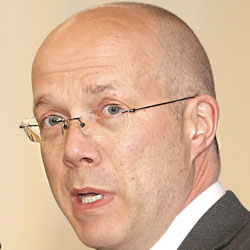
The recapitalisation of Tajikistan’s two largest banks will be ineffective unless the country’s government follows through with a radical transformation of the sector, according to the EBRD’s head of financial institutions.
Nick Tesseyman told GlobalMarkets that the EBRD wanted to see progress on restructuring before it would consider direct investment in Agroinvestbank (AIB) and Tojiksodirotbank (TSB).
“There may be longer term opportunities to get more conventionally involved in those banks but that’s for the future,” he said. “We need to figure out how they are going to operate first. They need to become regular operating banks, they need to be stabilised, they need to have good management in place.”
AIB and TSB suffered severe liquidity crises last year, leading both banks to impose freezes on deposit withdrawals. Customers of AIB were unable to withdraw cash for six months.
Development banks operating in Tajikistan, including the EBRD, were suggested as potential investors in TSB but no deal had materialised by the end of 2016.
“We were seeking a comprehensive long-term road map for the Tajik banking sector in concert with our fellow IFIs, including the IMF, but it was obviously difficult to reach agreement on many of these issues,” said Tesseyman. “In the end the authorities took the decision that time was crucial and therefore used their own funds to recapitalise the two largest banks.”
On December 21, the Tajik parliament approved a recapitalisation of the two lenders. TSB received a Ts2.25bn ($264m) equity injection, while AIB received Ts1.7bn.
LOCAL BANKS
Problems at both banks have persisted, however, with limits on daily withdrawals remaining in place. Non-performing loans (NPLs) also remain high across the sector, particularly at public sector banks. “This reflects different approaches to governance and lending in the past,” said Tesseyman.
He noted that the EBRD was well placed to help address this issue. “Local capacity for resolving, restructuring and working out NPLs is limited — as it is in many of the countries where the EBRD operates — so our role will be to support and facilitate that rather complex and difficult process,” he said.
At present, the EBRD has only one equity investment in Tajikistan. The development bank holds a 21.1% stake in Eskhata Bank, a small private sector lender. Tesseyman said the EBRD had continued to work with other local banks.
“We are continuing to work carefully with a small number of banks and non-bank financial institutions that we have long-term relationships with, both to signal ongoing support and to provide actual ongoing lending support rather than investment,” he said.
